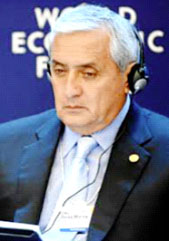GUATEMALA CITY, (Reuters) – Guatemala’s jailed former president, Otto Perez, says he regrets bowing to U.S. pressure to extend the work of an anti-corruption unit that then toppled him from power and that it was U.S. Vice President Joe Biden who forced his hand.
Perez resigned and was arrested last month after Guatemala’s attorney general and the U.N.-backed anti-corruption body accused him of leading a customs racket.
 In a series of meetings earlier this year, U.S. officials pressured Perez to fire corrupt officials and allow the International Commission against Impunity in Guatemala (CICIG) to continue its work, officials with direct knowledge of the talks have told Reuters.
In a series of meetings earlier this year, U.S. officials pressured Perez to fire corrupt officials and allow the International Commission against Impunity in Guatemala (CICIG) to continue its work, officials with direct knowledge of the talks have told Reuters.
Renewing the CICIGs mandate “was one of the things I must regret,” Perez told Reuters on Saturday at the military prison where he is being held awaiting trial. He maintains he is innocent of the charges against him.
Perez said he opposed CICIG’s work because it was trampling on Guatemala’s sovereignty but that Biden demanded he renew its mandate and threatened to halt U.S. aid to Guatemala if he refused.
“He told me it was practically a condition” for the aid, Perez said in a small courtyard surrounded by 10 guards, adding that Biden pressured him twice in person and twice on the phone.
CICIG spearheaded the probe into the alleged customs racket and was working closely with Attorney General Thelma Aldana. Perez reluctantly agreed in April to allow it to continue its work and its investigation led to the removal of cabinet ministers, the vice-president and finally Perez himself.
Perez said CICIG amounts to “a new form of (U.S.) interference” in Guatemala’s affairs and that his country has surrendered its sovereignty over the justice system by allowing the unit to operate.
“It is a commission that reports to no-one,” he said, accusing its head, former Colombian state prosecutor Ivan Velasquez, of using the support of the U.S. government and the United Nations to throw his weight around.
“With the interests of the U.S. embassy behind him, he felt all-powerful and undoubtedly responds to their interests.”
A spokeswoman for Biden said the vice president had “consistently made clear to leaders throughout the Central American region that U.S. assistance was only possible if they continued to make progress on tackling corruption”.
She said that Biden, who on Wednesday ruled out a run for president in 2016, emphasized that CICIG’s extension was important in the effort and that “has also made clear that CICIG is a model other countries should emulate.”
She did not say whether Biden specifically made the extension of CICIG’s mandate a condition of continued U.S. aid to Guatemala.
